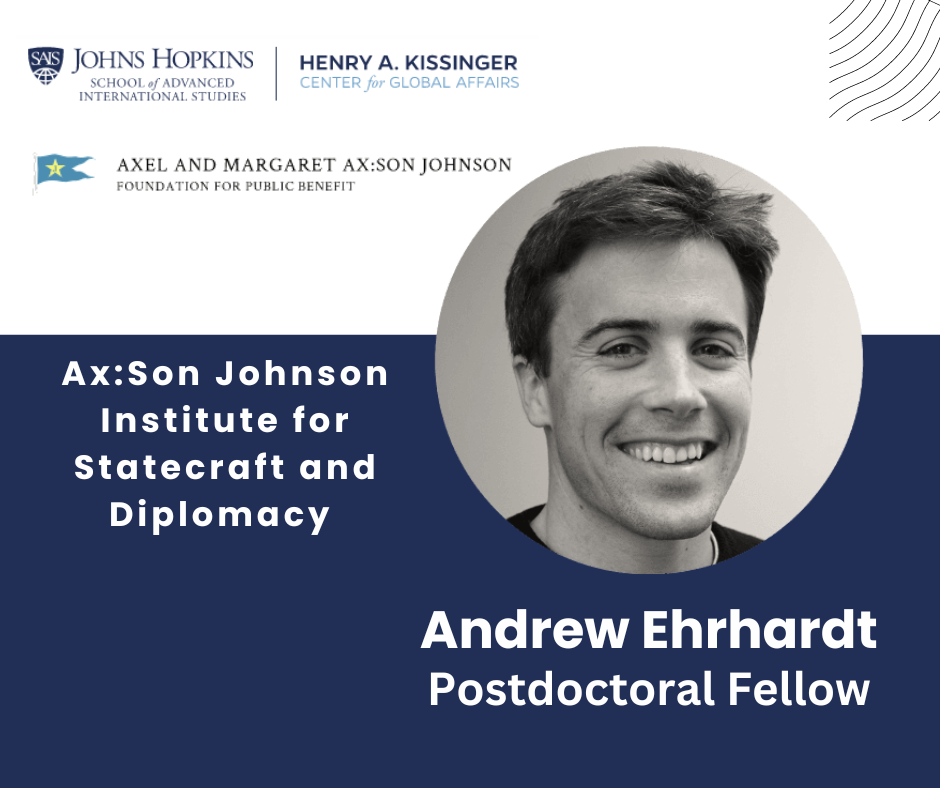Featured Scholar: Andrew Ehrhardt

What are your current research interests?
I spent the majority of my time as a doctoral student working on British diplomacy during the Second World War, specifically around post-war planning. This is a topic I remain interested in, but my research focus has expanded a bit to include conceptions of international order in the nineteenth and twentieth centuries, as well as ideas around the nature, purpose, and methods of historical study.
What project(s) are you currently working on, and what work are you most excited about?
Most of my time is spent working on a manuscript adapted from my PhD thesis which I completed in 2020. It is tentatively titled A Grand Strategy for Peace: Britain and the Creation of the United Nations, 1939-1945 and is currently under review with Cambridge University Press. I’m lucky to have landed on a PhD topic, and now a manuscript topic, that doesn’t bore me in the slightest. There are always new and interesting finds from the archives, and the individuals and groups involved in the process include some fascinating intellects.
My other work at the moment focuses on the relationship between the disciplines of History and International Relations in the present day. I am trying to make an argument which will no doubt upset some folks who adhere to more social scientific methods. I make the case for why History, as opposed to International Relations and Political Science, is best suited for understanding the essence of statecraft. We will see if it gets through the review process – I might need to submit to history journals only!
Another ongoing project is A Modern Symposium on World Order, where I’ve developed 10 or so fictional characters who engage in a discussion on the conceptions, structures, and future of international order. I’ve read so much material in recent years on the amorphous topic of world order – readings and ideas that continue to bounce around in my mind – that I figured a good way of ordering some of my thinking on the subject was to create characters who champion certain approaches to order. I am not sure what exactly I will do with the draft, much less who might be interested in it; but my aim is to write something that might serve as a jumping off point for those interested in the subject of world order.
How and when did you develop this interest? How did it evolve?
During my time as a PhD student, I was lucky to be around as the trans-Atlantic Applied History initiative took off. The idea of historical study being immanently useful to questions of practical policy seems obvious in hindsight, but there was a lack of such a clear connection, particularly within doctoral programs.
From this basic premise – that history can inform policy – I began thinking more about the deeper assumptions and methods around this practice. Is the past useful because the nature of humans and their societies remains somewhat static? How should we think about historical processes? Is there a direction in which history is moving? Is there meaning in history? These are questions that historians and philosophers have grappled with for centuries, if not millennia, but answers are hard to come by. The chance to study these questions and the great thinkers who have addressed these and related topics seemed like a nice way to supplement my doctoral research. Now, I’m hooked!
What drew you to the Kissinger Center and your current fellowship?
Since its founding in 2018, the Kissinger Center has distinguished itself as a group of scholars and students focusing on the great historical and philosophical questions of statecraft. Professors Gavin, Brands, Sarotte, and Radchenko, as well as a number of doctoral fellows I’ve had the chance to work with in recent years, embody this approach. The opportunity to learn from these scholars – how they approach archival work, how they communicate their thinking to policymakers and the public, and how they teach diplomatic, military, and intellectual history – seemed like the chance of lifetime. My particular fellowship is sponsored by the Ax:son Johnson Institute for Statecraft. I’ve been fortunate to work with members of the Axel and Margaret Ax:son Johnson Foundation for several years now, and their commitment to supporting younger historians, especially those working in the fields of diplomatic and intellectual history, has been world-leading.